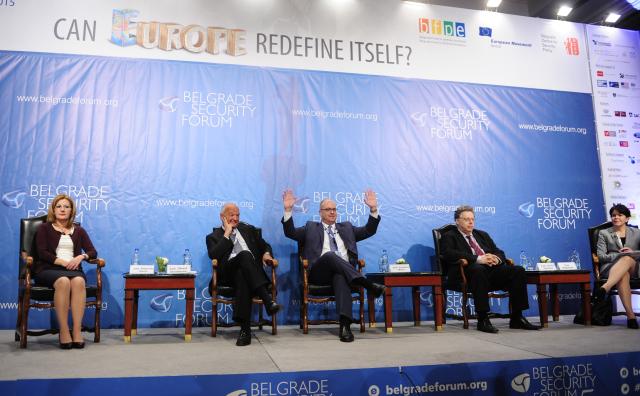



| Thursday, 01 October 2015. | |
| State Secretary Roksanda Nincic participated in the “Reaffirmation of the OSCE Role in Conflict Management” at the Belgrade Security Forum | |
| + larger fontnormal font- Smaller font |
 Participants of the 5th Belgrade Security Forum estimated that the Organization for Security and Cooperation in Europe (OSCE) was a unique forum and also an instrument for the preservation of peace, stating that the institution was a very good tool in the “right hands”. Participants of the 5th Belgrade Security Forum estimated that the Organization for Security and Cooperation in Europe (OSCE) was a unique forum and also an instrument for the preservation of peace, stating that the institution was a very good tool in the “right hands”.State Secretary at the Ministry of Foreign Affairs of Serbia Ambassador Roksanda Nincic, participating in the “Reaffirmation of the OSCE Role in Conflict Management”, recalled that at the time when Serbia was a candidate for the OSCE Chair, the Ukraine crisis was not looming, and that the OSCE was the only organization today which mediated in resolving the crisis on the ground. According to her, the OSCE undoubtedly has advantages, such as experience in mediation and conflict management. Nincic said that the OSCE would make its contribution to resolving the migrant crisis, and expressed optimism about the future of the Organization. She said that the OSCE had done in Ukraine effectively what it could, deploying very quickly a Special Monitoring Mission (SMM) being “the eyes and ears of this international organization”, but stressed that SMM had no access to sensitive locations, for which political will was necessary. Nincic added that the Trilateral Contact Group (TCG) was performing excellent diplomatic activities and coordinating the situation on the ground. She also pointed to the problem of insufficient information exchange between the OSCE countries, not just when speaking of the Ukrainian crisis, but in general, for political reasons. She emphasized that the goal of Serbia, as the OSCE Chair, was to be a transparent and honest broker while avoiding ideological conflicts and indicated that “it was not an easy task to bring all the actors of the Ukrainian crisis to the negotiating table.” The OSCE Chairperson-in Office Special Envoy for the Western Balkans Gerard Studman recalled that the 90’s created a geopolitical vacuum, in which the OSCE was able to impose itself as an instrument in crisis management and building of trust. He stressed that the OSCE was the only forum where Americans and Russians sit and talk together, adding that it was very important. He said that in February 2014, the OSCE did not have an early warning of the crisis in Ukraine and any plan for its resolution, but as he pointed out, the situation quickly changed, and the OSCE had quickly responded. The OSCE, as he specified, was successful in resolving the Ukrainian crisis due to the rapid deployment of missions and flexible facilitation efforts. Studman stressed that international organizations such as the OSCE and the UN depend on the political will and the skill of the Member States to use their resources adding that there was no need to create new institutions within the OSCE, because they already existed in the OSCE. Head of the OSCE Mission to BiH Jonathan Moore estimated that the consecutive chairmanships of Switzerland and Serbia was very useful for field work and for the work of the organization itself. He pointed out that, 20 years after Dayton, BiH had a lot of important issues needed to be resolved, and that the OSCE Mission could make an important contribution to it. He said that the OSCE had great credibility in BiH and energy to contribute to the solution of problems, and it cooperated excellently at the local level in particular. Former State Secretary of Finland, Director of the Institute of International Affairs Tiilikainen Teija, who is also a member of the Panel of Eminent Persons, pointed out that the OSCE weaknesses should be addressed in order to improve the Organization. She stressed that the study conducted in Finland indicated the importance of the principle of consensus and therefore considered the OSCE a useful organization. She said however that there were things to be done to make the OSCE more efficient. The OSCE, in her opinion, should have an important role in the foreign policy agendas of member countries, since they determine the role of the Organization. She added that field missions were something special and the key to rapid alert of capacities and something that should be given special attention, stressing the need for establishing a rapid alert system. She underlined that the OSCE should remain an important platform for arms control, the measure for establishing security and that it was today more important than ever before to increase confidence among the OSCE participating States. |